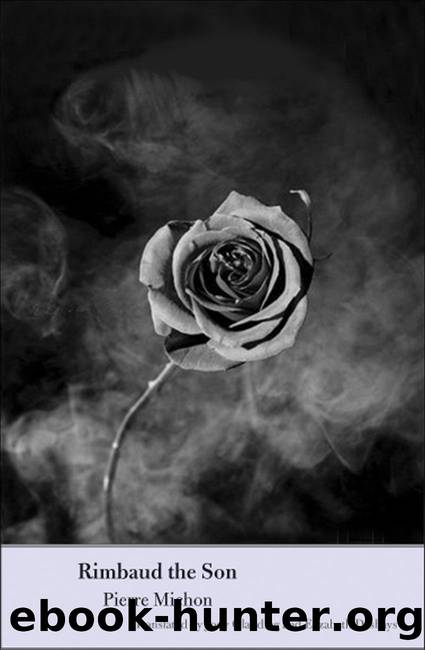Rimbaud the Son (The Margellos World Republic of Letters) by Michon Pierre

Author:Michon Pierre [Pierre, Michon]
Language: eng
Format: azw3
Publisher: Yale University Press
Published: 2013-10-22T00:00:00+00:00
It is said that they killed one another in that way because their characters were ideally opposite, like the sun and the moon; because one had the brilliance of the day, the ardor of the day, strength and the seven-league boots, while the otherâs aspiration was to barely glisten, to appear between branches, to set, to flee; because one fomented la poésie moderne while the other made do with old-fashionedness, that is to say, made use of that very old and effective mix of sentiment and end rhyme that, strangely enough, we customarily forgive Malherbe, Villon, and Baudelaire for using, but not Verlaine; also because Verlaine, indecisive and divided like the moon, did not give himself with his whole soul, was not entirely in London and had left a part of himself in Paris, from where the little wife sent letters and pressed as persuasively as Eve upon the E string. These characters are too strongly contrasting not to be false; we have retouched them at our poetsâ desks.
It is also saidâto explain the herrings and the six-shooterâthat they were consumed by the derangement of all the senses, to which they both earnestly applied themselves, because surreptitiously they both wore the red waistcoat; they applied themselves to it; they did not become seers and pursued clairvoyance in pure drunkenness, which so much resembles it: and we can well believe that ten months of shared bingeing turned two impetuous young men into the convulsionaries of Brussels, on the day when from the cauldron of stouts the muzzle of the six-shooter emerged like a flower. I do not believe in the nightingale argument according to which Rimbaud, aware of his genius, as we say under our silk skullcaps, scorned Verlaine, Verlaineâs poetry, and accused him of being without genius; because Verlaine had genius; and Rimbaud, ravaged and incurable as he was, was modern with less absolutism than we are. But I do believe, as I have said, that in confronting one another, their respective E strings wore each other out; for both of them their little string, the Orphic E string, the string of poetic destiny without parallel, without measure, which Baudelaire had taught them both to play and which so easily gets stuck; upon which they pressed down hard; upon which you must play for yourself, convince yourself, and you cannot do so for long if another E string is squeaking next to you: for the simple reason that in a single room in Camden Town it is not possible for both to be verse in person at the same time. That cannot be shared between living beings, one of the two E strings must break.
And Rimbaud pressed harder.
Rimbaud played with greater care. He wanted to be poetry in person more strongly than Verlaine did, to the exclusion of anyone else: because that was the only condition by which he could hope to appease the old woman in the inner well, to allow her a bit of a rest, the dark fingers finally relaxed, the hand open, no more tampering, just the tenderness of sleeping flesh.
Download
This site does not store any files on its server. We only index and link to content provided by other sites. Please contact the content providers to delete copyright contents if any and email us, we'll remove relevant links or contents immediately.
The Power of Myth by Joseph Campbell & Bill Moyers(1068)
Half Moon Bay by Jonathan Kellerman & Jesse Kellerman(987)
A Social History of the Media by Peter Burke & Peter Burke(985)
Inseparable by Emma Donoghue(983)
The Nets of Modernism: Henry James, Virginia Woolf, James Joyce, and Sigmund Freud by Maud Ellmann(912)
The Spike by Mark Humphries;(811)
The Complete Correspondence 1928-1940 by Theodor W. Adorno & Walter Benjamin(788)
A Theory of Narrative Drawing by Simon Grennan(781)
Culture by Terry Eagleton(775)
Ideology by Eagleton Terry;(741)
World Philology by(719)
Farnsworth's Classical English Rhetoric by Ward Farnsworth(715)
Game of Thrones and Philosophy by William Irwin(712)
Bodies from the Library 3 by Tony Medawar(709)
High Albania by M. Edith Durham(704)
Adam Smith by Jonathan Conlin(693)
A Reader’s Companion to J. D. Salinger’s The Catcher in the Rye by Peter Beidler(688)
Comic Genius: Portraits of Funny People by(652)
Monkey King by Wu Cheng'en(652)
